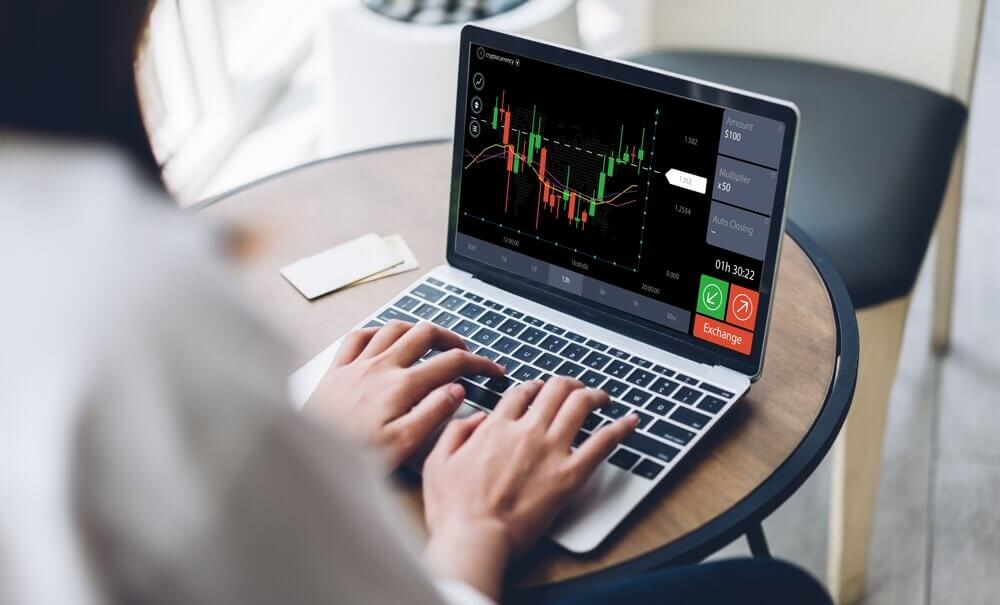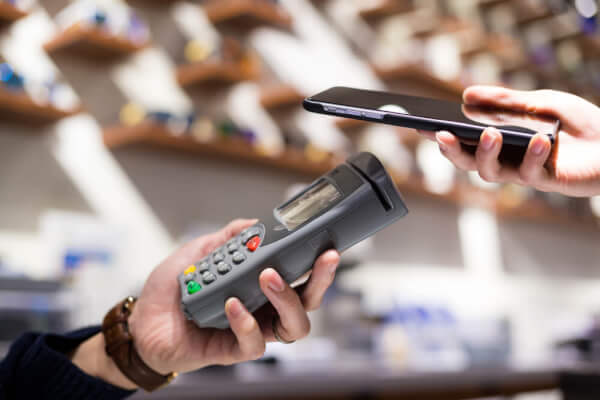Does CIMB support Apple Pay? All you need to know about virtual cards and alternatives
Find out if CIMB users can use Apple Pay and if the card can be added to your Apple Wallet. More on that and virtual card alternatives.

| Disclaimer: The information in this article is for reference purposes only. Wise does not offer to buy or sell stocks, and all information on this page should not be considered financial advice. All investment decisions should be made after thorough research and consultation with a qualified financial advisor. Remember that investments, even in low-risk funds, are never guaranteed and your capital is at risk. |
|---|
If you’re new to investment you might be wondering how to buy stocks in Malaysia in the most efficient and low cost way. Investing in assets in Malaysia and globally is a common choice among people trying to build a nest egg - and with a recent rise in independent trading platforms, it’s a pretty accessible option, too.
This guide walks through the basics of investing in stocks in Malaysia - it’s not a substitute for doing your own research, as everyone’s investment needs and risk tolerance is different. But we’ll kick you off with a look at processes, bank brokerages and a few of the best trading platforms in Malaysia for you to consider.
| Table of contents |
|---|
To buy stocks in Malaysia you’ll first need to open a CDS account (Central Depository System1) with an authorised agent, broker or platform. There are different types of CDS accounts, and lots of different bank brokerages and independent broker services out there. Once you’ve found the right brokerage for your specific investment needs, trading is pretty easy, and often done online. We’ll walk through the basic steps on how to start trading in Malaysia in just a moment.
Before we get into too much detail, let’s get a quick definition. A share is a specific term for a unit of an asset - so a share of a company for example. The term stock can be more general, and refer to the ownership of multiple different assets across different companies.
You’ll hear the terms stock and share used pretty much interchangeably in day to day conversation. Technically they’re a bit different, but it’s not really worth worrying about - both words are used commonly to mean the same thing.
If you’re new to investing it might pay to get some personal advice to make sure you pick assets which suit your personal needs. The basic process of investing and trading is simple and can be done online or in an app in many cases. The key for many people is finding a brokerage solution which is easy to use and which keeps costs down. Your knowledge on investing also matters - do you already know the baiscs of how to invest in stocks, or are you completely new?
Here’s an overview of the basic steps you’ll take to start trading in Malaysia:
Different brokers ask for different things when you open an account. At the very least you’ll need to prove your identity for verification purposes - but you might also have to show you can afford to invest a certain amount. Documents requested could include:
If you’re investing in overseas markets and need to pay into your brokerage account in a foreign currency, using a service like Wise can be a cheap and convenient way to convert your MYR to the currency required. Popular online brokerage services like Tiger Brokers and Interactive Brokers have partnered with Wise to make it easy to fund your account in whichever currency you need, with the mid-market exchange rate and low fees.
| 🤔 Need an international e-wallet to top-up your trading accounts? See how Wise compares with top e-wallets in Malaysia |
|---|
So - how to buy shares in Malaysia in the most convenient way, with the lowest possible fees. There are plenty of different options which can be a little daunting at first, particularly as each bank or independent broker has its own fee structure.
Broadly speaking you’ll choose between a bank brokerage or an independent platform depending on your preferences and investment needs. Banks will often offer a very wide range of assets you can buy and sell. Independent brokers may also have a very wide product range, but some specialise more in one area or another - for example, in US stocks or tech companies.
We’ve delved into the options in a bit more detail here - but you’ll also need to do your own research to pick the right brokerage solution, based on your own unique needs to start.
Major Malaysian banks often have investment options, allowing you to open a bank brokerage account with your normal bank. You’ll often find you need a regular MYR account with the same bank, and can then trade online for convenience once your account is set up. The fee structures for bank brokerages can be complicated and will depend on the market you buy in.
To give an example, we’ve set out some example costs for trading in Malaysian stocks, so you can see how the costs vary depending on the value of the trade. Be sure to check all the costs involved before you sign up to a brokerage as each trade could have different fees - and ongoing charges may also apply to your account.
| Bank brokerage | Minimum fee | Fee for contracts to 100,000 MYR in value | Fee for contracts over 100,000 MYR in value |
|---|---|---|---|
| HLeBroking (Hong Leong Bank)² | 12 MYR | 0.38% brokerage fee | 0.18% brokerage fee |
| UTrade by UOB Kay Hian (collaterised account)³ | 8 MYR | 0.3% brokerage fee | 0.2% brokerage fee |
| Maybank Share Trading Cash Account⁴ | 8 MYR | 0.1% brokerage fee | 0.1% brokerage fee |
Independent brokerages are usually available online or through apps. They’re convenient to use and can often have fairly low fees - after all they don’t have a branch network to maintain. As these tend to be digital services they’re usually offered on a self-serve model - you’ll be guided through the process of trading on the provider app, and can manage your account from your phone.
Independent brokerages may have their own rules about how to access services - for example, it’s quite common to find that accounts can only be paid into using a currency like USD or SGD. You may also find you can only buy shares on specific markets.
Where you need to pay into a brokerage account in a foreign currency, platforms often have a link up with a specialist in cross border payments and currency conversion - like Wise. Using a specialist service, such as Wise, to add money to your brokerage account keeps costs down and can mean you get a better exchange rate than you would from a bank.
Here’s a quick summary of some common fees for 3 popular independent brokers - we’ve used the example of trading US assets here to paint a picture of charging structures:
| Independent brokerage | Fixed fees | Service fees |
|---|---|---|
| Interactive Brokers (IBKR)⁵ | No platform fee | 0.005 USD per share fixed fee, tiered pricing also available |
| Tiger Brokers⁶ | Fees may be waived for 180 days for new customers | 0.005 USD per share platform fee, minimum 1 USD |
| eToro⁷ | 5 USD withdrawal fee 10 USD/month inactivity fee may apply if you don’t use your account in 12 months | No commission for stocks and ETFs Currency conversion fees apply |
🤝 Use your Wise account to streamline and maximise foreign currency top-ups on partner platforms like Tiger Brokers and Interactive Brokers.
Investing is a common option for people looking to save money for future use and grow their overall financial wellbeing. The rise of independent brokerage app services has meant that it’s easier than ever to invest in Malaysia, with accessible and low fee ways to buy and trade stocks and shares, locally and globally. Investing does come with risks - so you’ll need to get personal advice to make sure you’re making the best possible use of your money - but it can also offer some distinct rewards. Use this guide to start figuring out your investment journey - and good luck!
Sources:
*Please see terms of use and product availability for your region or visit Wise fees and pricing for the most up to date pricing and fee information.
This publication is provided for general information purposes and does not constitute legal, tax or other professional advice from Wise Payments Limited or its subsidiaries and its affiliates, and it is not intended as a substitute for obtaining advice from a financial advisor or any other professional.
We make no representations, warranties or guarantees, whether expressed or implied, that the content in the publication is accurate, complete or up to date.

Find out if CIMB users can use Apple Pay and if the card can be added to your Apple Wallet. More on that and virtual card alternatives.

Find out if UOB users can use Apple Pay and if the card can be added to your Apple Wallet. More on that and virtual card alternatives.

Find out if Public Bank users can use Apple Pay and if the card can be added to your Apple Wallet. More on that and virtual card alternatives.

Find out if AmBank users can use Apple Pay and if the card can be added to your Apple Wallet. More on that and virtual card alternatives.

Find out if Bank Islam users can use Apple Pay and if the card can be added to your Apple Wallet. More on that and virtual card alternatives.

Find out if RHB users can use Apple Pay and if the card can be added to your Apple Wallet. More on that and virtual card alternatives.